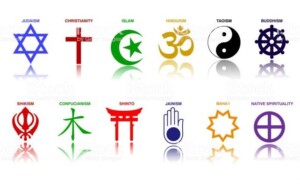As a friendly Christian, I understand that the existence of different religions and their conflicting beliefs can be a source of confusion and challenge. However, I believe that there are ways to approach this topic with respect and understanding.

The Bible, in John 14:6, Jesus said, “I am the way, the truth, and the life. No one comes to the Father except through Me.” This verse emphasizes the unique claim of Jesus Christ as the exclusive path to God. As Christians, we believe in the truth of Jesus’ teachings and the salvation offered through Him.
While we hold firmly to our Christian faith, it is essential to approach discussions about other religions with a spirit of love, humility, and respect for different beliefs. The Bible encourages us to be gentle and kind, as in Colossians 4:6, where it says, “Let your speech always be with grace, seasoned with salt, that you may know how you ought to answer each one.”
It is crucial to engage in thoughtful conversations and seek common ground whenever possible. We can respectfully listen to others’ beliefs, understanding that they come from their unique cultural and personal backgrounds. Through open dialogue, we may find points of agreement or shared values, fostering mutual understanding and respect.
At the same time, as Christians, we can lovingly share the uniqueness of Jesus Christ and the message of salvation found in Him. Acts 4:12 states, “Nor is there salvation in any other, for there is no other name under heaven given among men by which we must be saved.” We believe that Jesus offers a personal relationship with God and eternal life through His sacrifice on the cross.
It is important to remember that we cannot force our beliefs on others or impose our faith upon them. Instead, we can share the hope and love we have found in Christ through our words and actions. 1 Peter 3:15 encourages us to “always be ready to give a defense to everyone who asks you a reason for the hope that is in you, with meekness and fear.”
As Christians, we hold firmly to our faith in Jesus Christ while approaching conversations about different religions with love, humility, and respect. We can listen to others, seek common ground, and share the uniqueness of Jesus’ teachings and the hope of salvation found in Him. May our interactions be guided by the love of Christ as we engage in meaningful conversations that promote understanding and foster peace.
As Christians, we can approach the existence of different religions with an attitude of respect and humility, recognizing that diverse belief systems are deeply rooted in individuals’ cultural, historical, and personal contexts. Embracing religious pluralism means acknowledging the right of every person to hold their own beliefs while affirming our own faith in Christ. It involves fostering an environment of dialogue, mutual learning, and peaceful coexistence.
While religions may differ in their beliefs and practices, there can often be shared values and moral principles that unite humanity. By seeking common ground, we can build bridges of understanding and promote harmonious relationships. It is through respectful dialogue and the recognition of shared values such as love, compassion, justice, and peace that we can find points of agreement and work together for the betterment of society.
Taking the time to understand the origins and foundational beliefs of different religions can provide valuable insights into their perspectives. By studying religious texts, sacred writings, and the historical context in which these beliefs emerged, we can gain a deeper understanding of the diversity of human spiritual experiences. This knowledge can foster empathy, dispel misconceptions, and promote meaningful conversations.
While respecting other belief systems, it is essential to hold firmly to our own faith and convictions as Christians. We should not compromise our core beliefs, but rather present them in a loving and respectful manner. By living out our faith authentically and demonstrating the transformative power of Christ’s teachings in our own lives, we can effectively share the uniqueness of Christianity while showing respect for others’ beliefs.
As Christians, we are called to love our neighbors as ourselves and to demonstrate the love of Christ to all people. Regardless of differing beliefs, showing compassion, kindness, and acceptance can bridge divides and foster genuine connections. By embodying the teachings of Jesus and extending grace to others, we can create a positive impact and be a witness to the transformative power of Christ’s love.
Prayer plays a vital role in navigating the complexities of religious diversity. By seeking God’s guidance and wisdom, we can pray for understanding, unity, and respect among people of different faiths. We can also pray for opportunities to share the message of Christ in a loving and compassionate manner, trusting in the Holy Spirit’s work to bring about understanding and change.
In conclusion, reconciling the existence of different religions and their conflicting beliefs requires an approach grounded in love, humility, and respect. As Christians, we can engage in meaningful dialogue, seek common ground, explore the roots of belief, hold firmly to our faith, demonstrate love and compassion, and pray for understanding and unity. In doing so, we contribute to a more harmonious world where diverse religious beliefs can coexist in an atmosphere of respect and mutual appreciation.
As an Amazon Associate we earn from qualifying purchases through some links in our articles.




